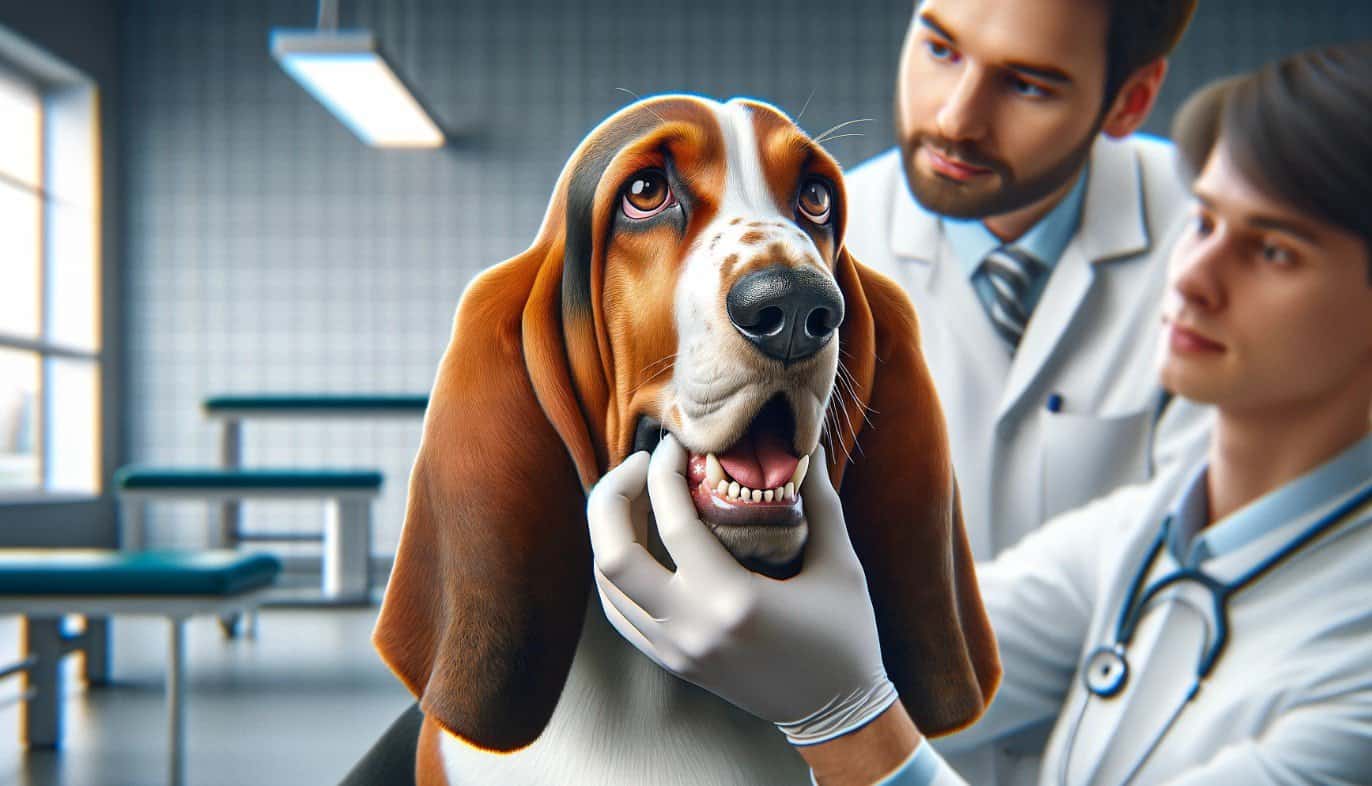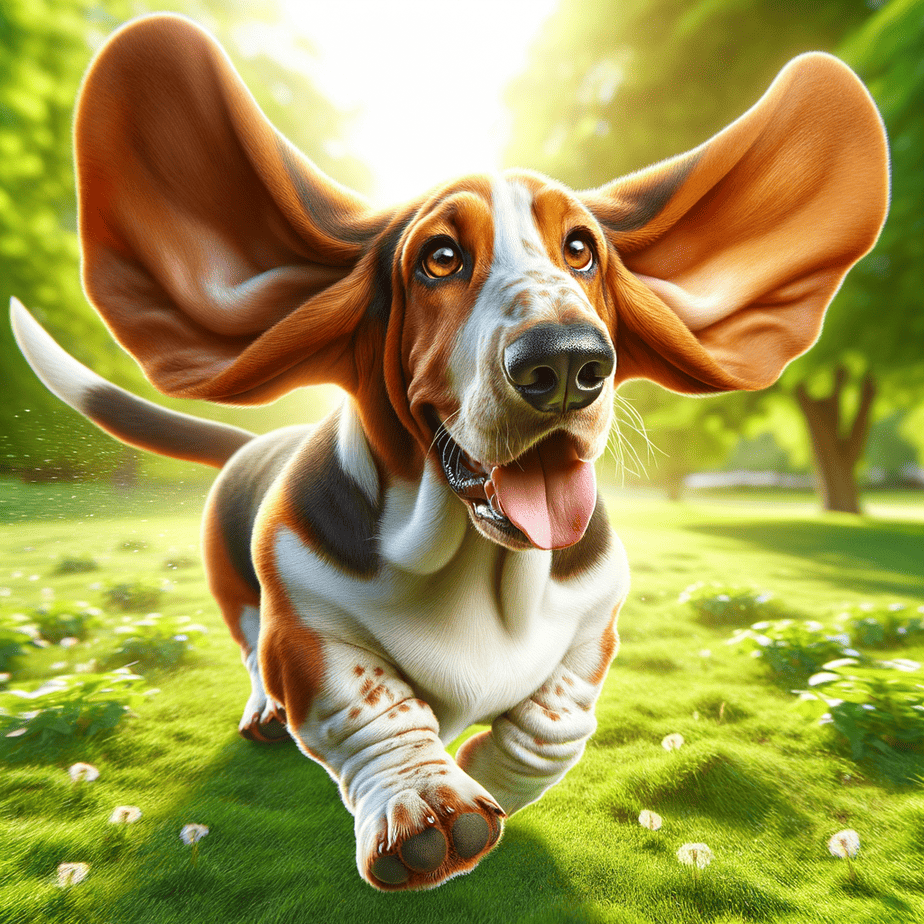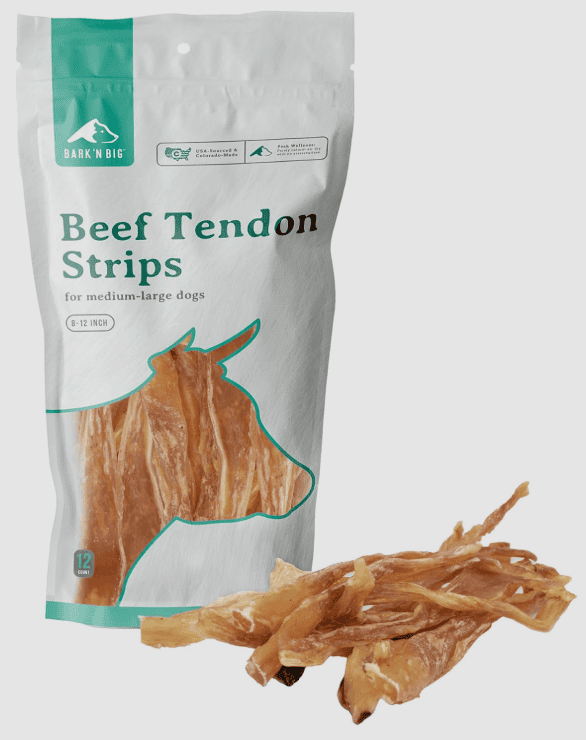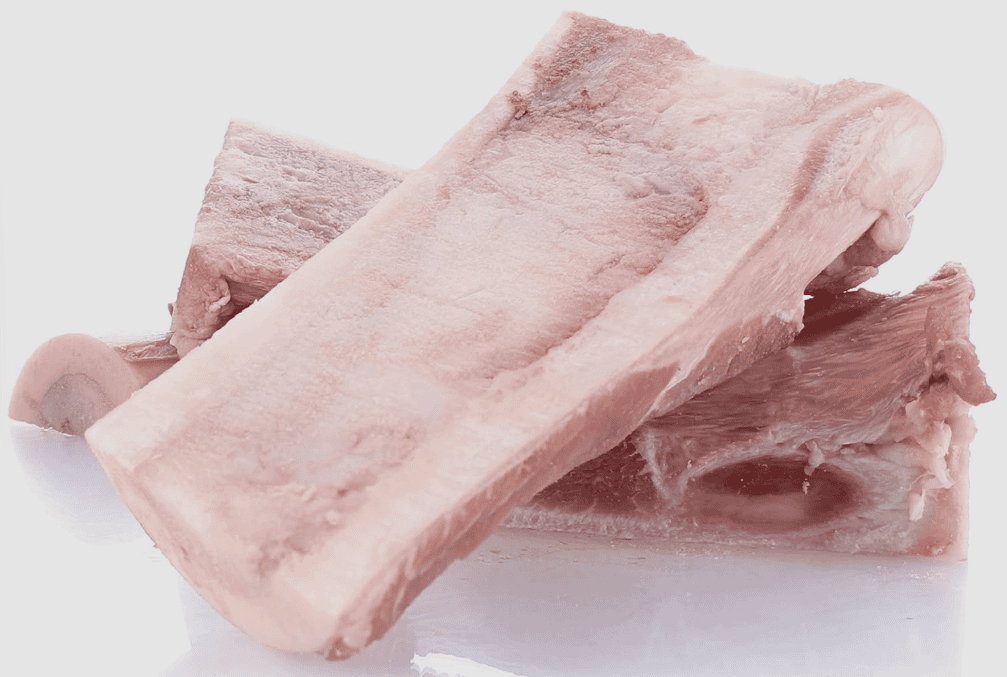Hi there, fellow pet parent! I’m Dr. Candy, a holistic veterinarian with a passion for helping dogs live their best, healthiest lives. Today, we’re going to chat about a topic that’s often overlooked but incredibly important – Basset Hound Dental Health.

Did you know that dental health is directly linked to your dog’s overall well-being? Yes, those adorable droopy ears and soulful eyes of your Basset Hound might be what steal your heart, but it’s their teeth that need your attention!
Just like us, our furry friends can suffer from a variety of dental issues, from bad breath and plaque buildup to more serious conditions like periodontal disease. And Basset Hounds, with their unique jaw structure and tendency to drool, are particularly susceptible to these problems.
But don’t worry, I’ve got you covered with holistic solutions and tips to ensure your Basset Hound’s pearly whites stay healthy and strong. So, let’s dive into the world of Basset Hound oral care and discover how to keep that doggy grin bright and beautiful!
Signs of Dental Disease in Basset Hound
Let’s talk about our beloved Basset Hounds. These adorable canines with their droopy ears and soulful eyes are a joy to have, but they are also prone to dental health issues. Recognizing the signs of dental disease early on can make a world of difference in your Basset Hound’s overall health and quality of life.
One of the first signs of dental disease is bad breath. While it’s normal for your furry friend to have a certain level of ‘doggy breath’, persistent foul odor could indicate a problem. This could be a sign of bacteria and plaque buildup, leading to gum disease.
Another sign to look out for is difficulty eating or loss of appetite. If your Basset Hound seems to be avoiding food, dropping food from their mouth, or chewing on one side, it could be due to oral discomfort. Receding gums or changes in the color of gums – from healthy pink to red, white, or even black – are also signs of dental disease.
Additionally, watch out for excessive drooling or pawing at the mouth. If your Basset Hound is drooling more than usual or seems to be in discomfort, it’s time to take a closer look.
Lastly, a change in behavior can also be a red flag. If your usually cheerful and playful Basset Hound suddenly becomes quiet, lethargic, or aggressive, it might be due to dental pain.
It’s important to remember that our Basset Hounds can’t tell us when they’re in pain. As responsible pet parents, we must stay vigilant and regularly check their oral health. Regular dental check-ups with your vet are also crucial in maintaining Basset Hound Dental Health.
- Bad breath
- Difficulty eating or loss of appetite
- Changes in gum color
- Excessive drooling or pawing at the mouth
- Change in behavior
Don’t wait for these signs to manifest before taking action. Prevention is always better than cure. Let’s delve deeper into the common dental health issues that Basset Hounds face and how we can address them in the next sections.
Common Dental Health Issues In Basset Hound
As a veterinarian, I’ve seen many Basset Hound dental health problems. This breed is prone to certain dental issues due to their characteristic droopy lips and long ears, which can trap bacteria and food particles leading to bad breath and other oral problems. Here are some common dental health issues that Basset Hounds often face:
- Periodontal Disease: This is a common issue in Basset Hounds. It begins with plaque buildup that hardens into tartar. If left untreated, it can lead to gum disease and tooth loss.
- Halitosis: Also known as bad breath, this is often a sign of a more serious dental health problem in Basset Hounds. It’s usually caused by bacteria buildup in the mouth.
- Broken Teeth: Basset Hounds love to chew, and this can sometimes lead to broken or fractured teeth. These can cause pain and lead to infections if not treated promptly.
It’s crucial to be aware of these Basset Hound dental health issues, as early detection can lead to more effective treatment. Regular check-ups and good oral hygiene habits can help keep your Basset Hound’s teeth healthy and prevent these common dental problems. Remember, a healthy mouth leads to a happy and healthy dog.

Conventional Dental Health Treatments for Basset Hounds
When it comes to maintaining your Basset Hound’s dental health, there are several conventional treatments you might want to consider. These treatments are usually recommended by vets and are proven to effectively combat dental diseases in your furry friend.
Anesthetic Dental Cleanings
One common treatment is anesthetic dental cleanings. This method involves putting your Basset Hound under anesthesia to allow the vet to thoroughly clean the teeth and gums. This process can help remove plaque, tartar, and bacteria that might be causing bad breath or other dental problems. It’s a more intensive treatment and is typically recommended for severe cases or as a regular preventive measure.
Potential Individual Health Obstacles
However, while anesthetic dental cleanings can be effective, they’re not suitable for all Basset Hounds. Some dogs may face individual health obstacles that make this treatment risky. For instance, Basset Hounds with heart problems might not be good candidates for anesthesia. Similarly, dogs with drug sensitivities, a history of seizures, or those of extreme age may also face increased risks.
Before proceeding with anesthetic dental cleanings, it’s crucial to discuss your Basset Hound’s overall health with your vet. They can provide guidance on whether this treatment is safe and beneficial for your dog or if alternative methods should be considered.
Remember, when it comes to your Basset Hound’s dental health, prevention is always better than cure. Regular teeth cleaning, proper diet, and use of dental chews can go a long way in maintaining your dog’s oral hygiene and preventing dental diseases. Always consult with your vet to determine the best dental care regimen for your furry friend.
Next, we’ll explore a holistic approach to oral and dental health, as recommended by Dr. Candy, that focuses on diet and probiotics. But more on that later.
Dr. Candy’s Holistic Approach To Oral & Dental Health
Now that we’ve discussed the signs and common dental health issues in Basset Hounds, as well as conventional dental health treatments, let’s delve into a more holistic approach to oral and dental health. I’m talking about the approach recommended by Dr. Candy, a renowned veterinarian with a focus on holistic pet care.
Diet- Low Carbs, Avoid Added Sugars, Enzymes In Fresh Food
First and foremost, diet plays a crucial role in your Basset Hound’s dental health. Dr. Candy recommends a diet low in carbs and added sugars. Why? Because carbs and sugars are breeding grounds for bacteria that can cause dental diseases. Instead, opt for fresh food that naturally contains enzymes which can help break down plaque and tartar.
- Feed your Basset Hound lean meats like chicken, turkey, and fish.
- Include a variety of fruits and vegetables in their diet. Not only are they low in carbs and sugars, but they also provide essential vitamins and minerals for overall health.
- Consider adding foods like raw carrots and apples to their diet. These foods are not only healthy, but they also naturally clean your dog’s teeth as they chew.
Oral Health Specific Probiotics
Another part of Dr. Candy’s holistic approach to Basset Hound Dental Health is the use of oral health specific probiotics. These are beneficial bacteria that can help maintain a healthy balance of microorganisms in your dog’s mouth.
One product Dr. Candy recommends is Probiora for Dogs. This oral health targeted probiotic is specially formulated to support a healthy oral microbiome, helping to reduce plaque, promote healthy gums, and freshen breath. It’s easy to use, too. Just sprinkle it on your dog’s food once a day.
Remember, a holistic approach to your Basset Hound’s dental health goes beyond just brushing their teeth. It involves taking care of their overall health, including their diet and gut health. And always consult with your vet before making any major changes to your dog’s diet or health routine.

Recommended Dental Chews & Products For Basset Hound
When it comes to maintaining your Basset Hound’s dental health, not all dental chews are created equal. Let’s first take a moment to address the elephant in the room – the failure of commercially promoted dental chews. It’s a common misconception that these products are a cure-all for your dog’s oral health issues. However, the truth is, many of these products are laden with artificial ingredients, additives, and even sugars that can contribute to dental decay rather than prevent it. They may provide temporary relief from bad breath, but they don’t address the root cause of the problem.
Even worse, some products like drinking water additives, which claim to improve oral health, can actually harm the beneficial bacteria in your dog’s gut. This can lead to a whole host of other health issues. So, it’s crucial to be discerning when choosing dental products for your Basset Hound.
Dr. Candy’s Recommended Dental Chews & Products
So, if commercially promoted chews aren’t the answer, what is? The key lies in single-source natural proteins. These are not only delicious for your Basset Hound but also aid in the natural cleaning process of their teeth. Here are some top picks:
Tendons
Tendons are a fantastic natural chew for your Basset Hound. They are tough and fibrous, which helps to scrape off plaque and tartar from your dog’s teeth. Plus, they are a good source of protein and collagen, promoting good joint health.

Raw Marrow Bones
Raw marrow bones are another excellent choice for maintaining your Basset Hound’s dental health. They are a natural source of calcium and phosphorus, which are essential for healthy teeth and bones. Furthermore, the act of gnawing on bones can help to clean your dog’s teeth and gums.

Bully Sticks
Bully sticks are made from 100% beef muscle, providing a natural and digestible chew for your Basset Hound. They can effectively remove plaque and tartar and are a good source of protein. However, always supervise your dog while they’re chewing on a bully stick to prevent any choking hazard.

Remember, while these chews can significantly improve your Basset Hound’s dental health, they should be used in conjunction with a balanced diet and regular vet check-ups. With the right approach, you can ensure your Basset Hound’s smile remains healthy and bright for years to come!
Frequently Asked Questions
1. How can I prevent bad breath in my Basset Hound?
Regular dental care is essential for preventing bad breath in Basset Hounds. Brush your dog’s teeth daily using a dog-specific toothbrush and toothpaste. Additionally, provide dental chews or toys that promote teeth cleaning and help reduce plaque buildup.
2. What are some signs of dental problems in Basset Hounds?
Some common signs of dental problems in Basset Hounds include bad breath, yellow or brown tartar buildup on teeth, swollen or bleeding gums, difficulty eating, pawing at the mouth, and loose or missing teeth. If you notice any of these signs, it’s important to consult a veterinarian.
3. Can diet affect my Basset Hound’s dental health?
Yes, diet plays a significant role in your Basset Hound’s dental health. Feeding a high-quality dog food that promotes dental health, such as kibble designed to reduce tartar buildup, can help maintain good oral hygiene. Avoid feeding your dog excessive amounts of sugary or sticky treats that can contribute to dental problems.
4. How often should I take my Basset Hound for professional dental cleanings?
It is recommended to take your Basset Hound for professional dental cleanings at least once a year. However, the frequency may vary depending on your dog’s individual needs and the advice of your veterinarian. Regular dental check-ups can help identify and address any dental issues before they worsen.
5. Are there any home remedies for bad breath in Basset Hounds?
While regular dental care is the most effective way to combat bad breath in Basset Hounds, there are some home remedies you can try. Adding a small amount of parsley to your dog’s food or using a water additive specifically formulated for freshening breath can provide temporary relief. However, these remedies should not replace proper dental care.
